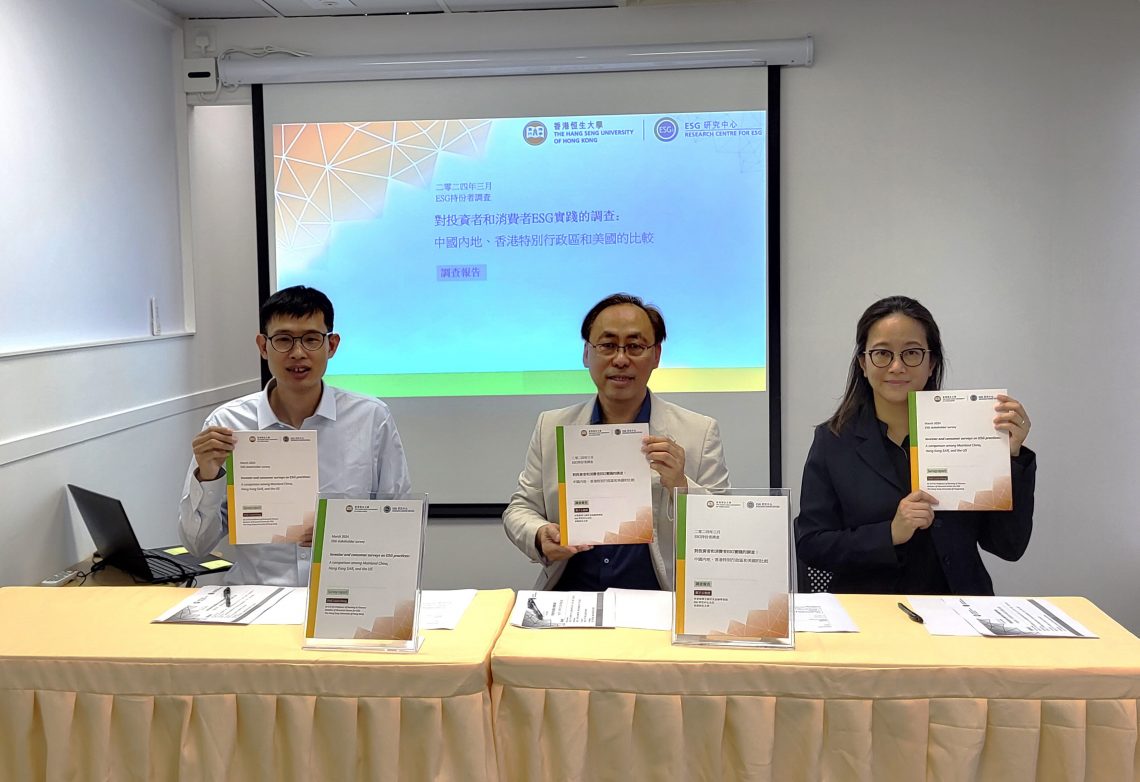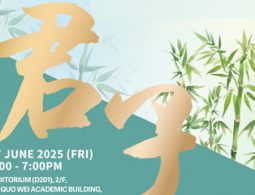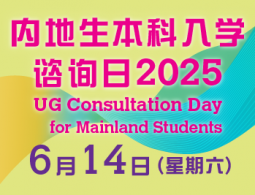30 April 2024
In recent years, Sustainable Development Goals as well as Environmental, Social and Governance (ESG) have become global trends and gradually exerted profound impacts in Hong Kong. The Research Centre for ESG at The Hang Seng University of Hong Kong (HSUHK) officially launched the ESG Stakeholder Survey Report, revealing that investors are more willing to invest in high-rated ESG stocks, and corporations with good ESG performance can attract investors while shaping employees’ green consumption behaviours, creating a win-win situation.
Funded by the Institutional Development Scheme of the University Grants Committee, Professor Louis Cheng, Dr S H Ho Professor of Banking and Finance and Director of the Research Centre for ESG at HSUHK, conducted two surveys under a project titled “Establishing a Research Infrastructure for ESG Intelligence: A Multi-Stakeholder Perspective” (RGC Ref No: UGC/IDS(R)14/21). In the report of “Investor and consumer surveys on ESG practices: A comparison among Mainland China, Hong Kong SAR, and the US” published in April 2024, the research team explores two stakeholders’ perspectives, including investors and consumers/employees. The surveys aim to provide insights for the role of corporations and how their ESG efforts and performances are assessed and evaluated by stakeholders.
For the “Investor” survey, the research team invited market research firms to conduct online surveys in the US and Mainland China in November 2023, with 291 valid responses received in the US, and 300 in Mainland China. The findings revealed that stocks’ ESG performance affects investors’ valuation. Investors bid higher for good ESG performance stocks, indicating their willingness to accept lower returns from high ESG stocks relative to low ESG stocks. One of the research team members, Dr Li King-king, Associate Professor from Shenzhen Audencia Financial Technology Institute, Shenzhen University, highlighted that “Both Investors from Mainland China and the US care about ESG performance by sacrificing returns in pursuing various ESG issues. However, Mainland Chinese investors are willing to sacrifice more returns to pursue ESG excellence when compared with American investors.”
In the “Consumer/Employee” survey, the research team engaged with a market research firm to conduct surveys in October 2023, with 315 valid responses received from the US and 317 from Hong Kong. It found that employees’ perception of their companies’ ESG/CSR performance would eventually enhance their green purchase behaviours as individual customers. Additionally, employees/consumers in Hong Kong exhibit a stronger preference for green purchase behaviours than those in the US. Another research team member, Dr Liane Lee, Assistant Professor at the Department of Marketing at HSUHK concluded that “Based on research analysis in the report, the positive relationship is stronger between companies’ CSR performance and green purchase behaviours of their employee-consumers when the corporate value is more synchronised with the green value of the employees.”
Professor Louis Cheng concluded “More importantly, there is a strong connection between the findings of the two surveys. The common element for the two surveys is the value of ESG performance of corporations. A company with good ESG performance can simultaneously attract investors and shape employees’ green consumption behaviours. Such a double impact of attracting investors and improving ESG impacts on society through employees appears to be stronger in Hong Kong and Mainland China than in the US. In short, corporations can create a win-win situation for their investors and employees in making real impacts on society.”
Full report: https://esg.hsu.edu.hk/esg-stakeholder-survey-report/

Related Posts
HSUHK 14th Junzi Corporation Awards Presentation Ceremony cum Business Leaders Forum
The HSUHK 14th Junzi Corporation Awards Presentation Ceremony cum Business Leaders Forum (“Ceremony”), will take place on 27 June 2025. This prestigious event will celebrate the outstanding achievements…
Year-1 Admission Online Talk Series (for HKDSE Candidates and Parents)
A series of online talks will be held via the online platform ZOOM in July 2025 to provide all-round support to HKDSE candidates and their…
Admission Procedures for 2025 entry
Date: 16 July – 22 August 2025 Details: https://admission.hsu.edu.hk Email: ugadmission@hsu.edu.hk (You are strongly recommended to contact us by e-mail)
HSUHK UG Consultation Day for Mainland Students 2025
Date: 14 June 2025 (Saturday) Time: 9:30 am – 5:00 pm Activities Highlights: Admission Talks (for Non-local Students) Exhibition and Consultation Programme Seminars and Workshop…



